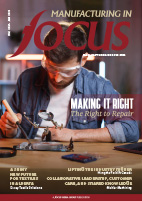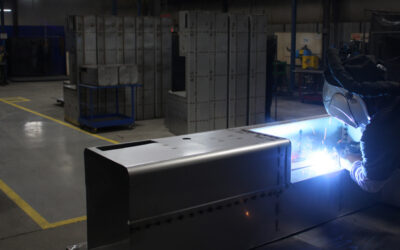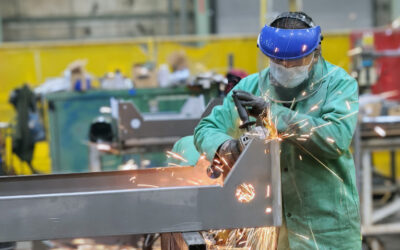Riley Gear Corporation has provided gears for spacecraft headed to Mars, for tanks used by Israeli and U.S. forces, and for cars, farm machinery, and other equipment. Based in St. Augustine, Florida, Riley Gear was founded just after the Second World War. Company specialties include precision gears, gearboxes, shafts, and assorted ancillary machined precision components.
~
“We currently manufacture all our gears and gearboxes in-house based on specifications agreed upon with our customers. Our products are not proprietary, as the designs are owned by our customers,” states Michael Burton, director of sales and marketing.
“We have the capability to do precision gears and shafts and gearboxes over a wide range of volumes and sizes. Our competition tends to focus on one end of the spectrum, either lower volume larger items or higher volume smaller items. We have melded both ends of the spectrum to provide a unique efficiency,” he says.
The company serves multiple sectors including aerospace, construction, automotive, off-highway transportation, robotic systems, and power generation. According to Burton, the company’s “two largest sectors, currently, in terms of revenue, are automotive and commercial on/off highway.”
“We are continuing to grow our business in all sectors based upon increased demand and our desire to diversify our markets and customers,” he adds.
Riley Gear’s business has been booming as of late, a fact Burton attributes to several factors, including a strong U.S. economy. Also, big original equipment manufacturers (OEMs) that established manufacturing plants in low-cost, off-shore locales are “starting to get a better feel of the real total cost,” of such moves, he notes. In addition to increased transportation costs and potential shipping delays, there have been concerns about the quality of products made by some off-shore manufacturers. Potential terrorism in overseas locales has also encouraged some American OEMs to “shorten their current global supply chains,” as Burton puts it.
Reshoring – that is, North American OEMs re-establishing domestic manufacturing operations – is a trend from which Riley Gear is well-poised to benefit.
That said, many of Riley’s U.S. based clients still have international operations, a situation which “requires us to be capable of shipping product and purchasing raw materials on a global basis,” notes Burton.
The Riley Gear Corporation was founded in 1946 in Buffalo, New York by Walter Riley and his son Donald. At first, the firm concentrated on making small precision gears for typewriters and telephone switches. Over the years, the focus of the company expanded, and business thrived.
In 1951, operations were moved to North Tonawanda, New York. A second manufacturing facility was opened in St. Augustine, Florida in 1988, to take advantage of lower operating costs in that state. One year later, Riley transferred its corporate headquarters to Florida.
The two manufacturing facilities produce gears for two distinct market segments. Riley can produce both small-sized, high-precision gears for automotive clients and “significantly larger gears, for construction equipment, agricultural equipment, fracking equipment, oil and gas equipment,” says Burton.
The manufacturing plants in Florida and New York are stocked with top-of-the-line machine tools and other equipment. The Florida facility has grinders from the likes of Reishauer and Okuma, lathes from Mazak, and mills from Haas. The North Tonawanda plant counts Cincinnati computer numerical control (CNC) lathes, Haas CNC milling centers, and Okuma grinders among its inventory.
Riley Gear has grown and succeeded over the decades by “embracing changes brought about in the marketplace through technology and by remaining focused on precision gears and shafts and gearboxes,” states Burton.
While eager to enter different markets, there are no plans to start making and selling other products beyond gears, shafts, gearboxes, and related items. Riley is looking to do “more in defense. We have a little presence in defense right now doing tanks and vehicles of that nature. Aerospace is a place we haven’t got anywhere near to what we [want],” says Burton. “We’re also looking at how to get into what I call the medical market.”
Savvy marketing and good products are not the only reasons for Riley’s longevity. The firm takes pride in supporting its workers and retains their loyalty in return. “Our manufacturing experts have, on average, thirty years of experience in precision gears, shafts, and gearboxes and the application of technology and new manufacturing techniques to our served markets,” says Burton.
The company currently has ninety employees in total, up from 83 last year at this time. “We’re looking to hire more. Our business has been growing over the last six, seven months. We foresee that we’re going to grow again, maybe anywhere from ten to fifteen percent next year,” states Burton.
As to what is driving this growth he says that it is primarily business from new customers as well as, “people we’ve done business with previously, who went offshore and are coming back.”
The company wants to continue adding machinists and other technical and engineering personnel. At present, the firm has seven engineers on staff, who use tools such as SolidWorks and GibbsCAM software for computer-aided design (CAD) and computer-aided manufacturing (CAM) purposes.
“We look for people who want to make a difference with their technical and business acumen, that understand we are a small yet tightly knit company that depends upon our people to be successful. We offer industry competitive benefits and provide the training required to bring our current and new employees up to the latest standards,” says Burton.
Riley’s corporate culture is exemplified by a ‘can-do’ attitude and an appreciation of “our customers, our fellow employees, and our suppliers,” he adds. “We’re focused on functioning as a seamless team to provide products and services in a timely manner.”
Safety and quality are both crucial at Riley Gear. “Our plants have myriad safety training programs, as we are very much focused on keeping all of our employees safe through our investments in training and company policies. We have a comprehensive worksite contingency plan that comprehensively covers a multitude of potential scenarios and situations that might be experienced by our facilities,” says Burton. There is specific training on topics such as fire safety, workplace violence, and hazardous materials.
Quality assurance, meanwhile, is viewed as an on-going duty. “Improving and maintaining quality in all our business endeavors including manufacturing, purchasing, sales, finance, and human resources is a continuous effort here at Riley Gear. We review our QOS (quality of service) system data and conduct internal and external audits to ensure that we are maintaining and improving our processes and procedures. Our current quality assurance systems are compliant with the latest automotive and aerospace standards,” says Burton.
The St. Augustine facility has AS9100D with ISO: 9001:2015, ISO 14001:2015, and IATF 16949:2016 certifications. The New York facility has AS9100D with ISO: 9001:2015 certification.
This focus on quality extends to firms that supply the company with parts, products, or materials.
“We look for suppliers that have the requisite aerospace or automotive or NADCAP quality certifications that want to work with us in a partnership to help us both grow our businesses. We have a number of preferred suppliers that meet these criteria for machines, materials, heat treating, and chrome plating along with other required coating processes that we work closely with to provide timely and high-quality precision products to our customers,” says Burton.
Riley Gear supplied gears to NASA for the Viking I Landing Vehicle that explored Mars in the late 1970s. The company has also worked on some high-profile military projects. “We supply a complete gearbox that is used on an engine that goes into an Israeli tank. We also currently supply numerous gears and other precision parts that are used on the M1 tank,” for the U.S. Army, adds Burton.
Promotion is approached in a multi-faceted manner. “We promote Riley Gear by exhibiting in various trade shows, using LinkedIn, ThomasNet, ads as we see the need, and through direct contact with customers,” says Burton.
The company is looking at new technologies and new equipment to enhance its services. “Riley Gear is exploring the potential for using 3D additive manufacturing (3D printing) for both prototyping and the production of precision gears. We continue to look into the potential vertical integration of our outside operations as our customers continue to ask for reduced lead-times. We are working on acquiring new machines and inspection equipment to meet our customer and market requirements for higher precision finishes. We continue to apply our cellular robotic automation experience to lower volume gears and shafts,” says Burton.
Current challenges include “diversifying our customer base and markets and responding to the current flood of inquiries from both existing, past, and future customers,” he continues.
Riley Gear has big plans for the future. “Our five-year strategic vision is to expand our current operations to support our planned growth into our current and future market targets while continuing to upgrade our people, machines, and processes. Specifically, we see increased diversification in our customer base by increasing our business in the defense, aerospace, and medical gear markets,” says Burton.












